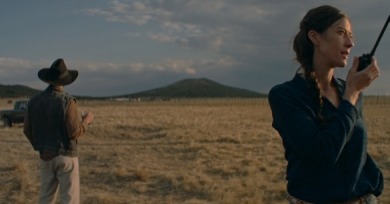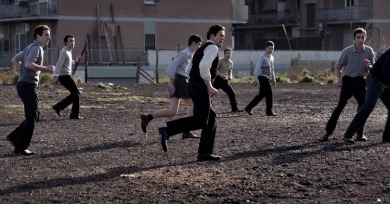Reviews
The specificity of China is largely displaced and obscured, and The Farewell never communicates the full force of its semi-connected scenes of sadness and lost identity.
The Mountain, the mournfully surreal, fitfully arresting fifth feature by Rick Alverson, describes America’s postwar “boom” as a spiritual implosion. And from the beginning of the 1950s-set film there’s no doubt that the patriarchy is the problem.
In exploring love, sex, death, and adultery this way, screenwriters Garrel and legendary screenwriter Jean-Claude Carriere adequately probe the meandering contours of relationships and commitment, as well as the elusive nature of monogamy and desire.
Aviles spent years developing her script by observing housekeepers at the same hotel where the film was shot. She accordingly grants the labor of her her protagonist a respect rarely seen onscreen.
Wild Rose insists on maintaining a wide-eyed and likable tone even as its protagonist offers glimpses of the deep-seated self-absorption that accompanies a person determined to live a life devoted to artistic expression.
The film, whose title sounds like an apocalyptic Simon and Garfunkel song, paints a portrait that raises questions of identity, authenticity, and our relationship to home.
Instead of tracing the more settled trajectory of the film—a gradual fall from grace to match the early passage from unfettered youth to straitened middle age—it seems more apropos to focus on his ecstatic cinematic orchestrations, which are, not to put too fine a point on it, the main attraction.
Jarmusch allows the droll humor to be swallowed in a vacuum of inertia, as if the fate of the world has been foretold and the characters are helpless to reverse what they have started.
The brilliance of the film is in its show-and-not-tell ethos; the history reverberating beneath the narrative speaks to characters striving for democracy and freedom, or some semblance of them.
It is a blessing that the 78-year-old continues to forego retirement, even if it means his films end up unceremoniously dumped to VOD, as was the case with the dazzling and mischievous Passion and now Domino, his surveillance-state European crime thriller.
There is a missed opportunity by Wilde and the screenwriters to deploy sharper satire that pokes fun at Molly and Amy’s limited outlook as white, woke-ish teenagers. This is too bad, since the whole conceit of Booksmart is that these friends think they know more than they actually do.
The Souvenir is a memorable cinematic lesson, so rich and articulated as to be better described as lived rather than seen. The emotional ecstasy it evokes is like falling in love for the first time.
This might seem to suggest a bit of a creative about-face, for Happy Hour, running a bit over five hours, was not precisely a commercial proposition, but in fact Asako I & II, in the space of two incident-heavy hours, works in every bit as much feeling and active intelligence as its predecessor.
Ferrara places an unusual emphasis on the quiet, placid environment in which his subject worked, the bedrock of domesticity which anchored him though ultimately could not protect him.













